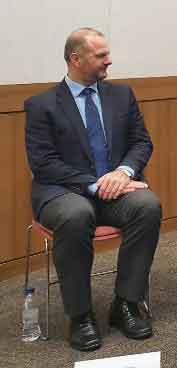An Irish expert on obesity and diabetes said Wednesday that prospects for treating these conditions have become brighter if doctors can provide patients with better education based on their latest achievements.

Professor Carel le Roux, head of pathology at University College Dublin, made these and other points during an interactive media event on obesity management globally and in Asia Novo, organized by Novo Nordisk Korea during the International Diabetes Federation (IDF) Conference 2019 in Busan.
Novo Nordisk held the event to share information for effective obesity treatment by raising awareness about obesity and examining global obesity treatment cases. After the interactive media event, Korea Biomedical Review shared a few minutes with Professor Carel le Roux to see how obesity treatment is changing and what some of the obstacles are in treating obesity.
Question: You mentioned that obesity treatment is going to get much better and will drastically change in the next five years. What does this mean, and what can we expect.
Answer: We can expect that new diets, medications, and surgical treatments that will allow people to lose double-digit weight loss and maintain that weight loss in the long run.
Now when I mean that treatment is going to get better, it is because we came to understand how we can use weight loss to generate health gain.
What doctors want is to make patients suffering from obesity healthier and prevent complications that can arise from obesity, such as type 2 diabetes, sleep apnea, or infertility.
To achieve such goals, however, I think we need to educate patients and remind them that treating obesity is about health gain and not just losing weight.
Q: Losing weight and managing weight loss are two different things. Diet and drugs are only effective as long as the patient takes them, and patients can relapse soon after they stop. Then what is the optimal way to manage obesity?
A: The first question patients ask doctors after agreeing to treat obesity is when they can stop the treatment. However, the answer is patients can stop their obesity treatment the moment they decide to regain their weight again.
Patients find it difficult to understand that they have to treat obesity for life, and it’s our job as doctors to make the patient know that this is a chronic disease.
The treatments do not make the patients more intelligent or motivated. All that the therapy does is that it changes the biology of the patient. However, we can add in psychological support to really optimize the benefit of the treatment.
Q: You talked about the need for the reimbursement of obesity treatments. However, obesity treatment is not something that can guarantee a successful outcome. How would you motivate government officials to give reimbursement for obesity surgery?
A: We can start small and reimburse patients that are definitely going to achieve some results through the treatment, such as patients with really high BMI. It is understandable that the government wants to have some certainty about the effects of treatment.
However, the fact remains that this is a chronic disease that needs chronic management.
If neglected, obesity can lead to further healthcare costs for the government as it can lead to other complications.

